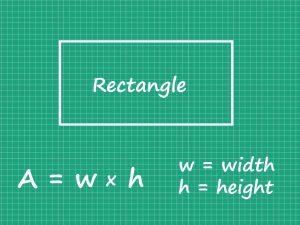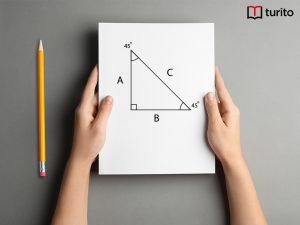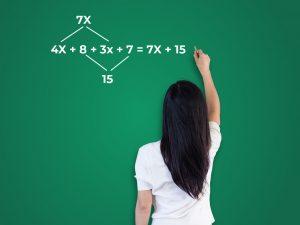Key Concepts
- Write equivalent rational expressions.
- Simplify a rational expression.
- Multiply rational expressions.
- Multiply a rational expression by a polynomial.
- Divide rational expressions.
Rational Expression
Concept
A rational expression is the quotient of two polynomials. The domain is all real numbers except those for which the denominator is equal to 0.
x2 / x2 −9 is an example of a rational expression.
Since the denominator cannot equal 0, x2 −9 ≠0
x2 ≠9 → x≠3 or −3
So, the domain of x2 / x2 −9 is all real numbers except 3 and -3.
Write Equivalent Rational Expressions
When are two rational expressions equivalent?
Rational expressions can be simplified in a process that is similar to the process for simplifying rational numbers.
12/16 = 3⋅2⋅2/2⋅2⋅2⋅2 = 3/2⋅2⋅2/2⋅2/2 = 3/2⋅2⋅1⋅1 = 3/4
By replacing quotients of common factors between the numerator and denominator with 1, you learn that
12/16 is equivalent to 3/4
Write an expression that is equivalent to
x3−5x2−24x / x3+x2−72x
Step 1:
Factor the numerator and the denominator.
x3−5x2−24x / x3+x2−72x = x(x2−5x−24) / x(x2+x−72) = x(x−8)(x+3) / x(x−8)(x+9)
Step 2:
Find the domain of the rational expression.
The domain is all real numbers except 0, 8, and -9.
Both
x3−5x2−24x / x3+x2−72x and x(x−8)(x+3) / x(x−8)(x+9) have the same domain.
Step 3:
Recognize the ratio of the common factors in the numerator and the denominator are equal to 1.

Simplify a Rational Expression
What is the simplified form of the rational expression? What is the domain for which the identity between the two expressions is valid?
4−x2 / x2+3x−10
The simplified form of a rational expression has no common factors, other than 1, in the numerator and the denominator.


The simplified form of 4−x2 / x2+3x−10 is −x+2 / x+5 for all real numbers except 2 and -5.
Multiply and Divide Rational Expressions
Multiply Rational Expressions
- What is the product of 2xy / z and 3x2 / 4yz ?
To multiply rational expressions, follow a similar method to that for multiplying two numerical fractions. The domain is z ≠0 and y ≠0.

The product of 2xy / z and 3x2 / 4yz is 3x3 / 2z2 for y ≠0 and z ≠0.
- What is the simplified form of the expression given below:

Multiply a Rational Expression by a Polynomial
What is the product of x+2 / x4−16 and x3 + 4x2 – 12x?

Divide Rational Expressions
What is the quotient of x3+3x2+3x+1 / 1−x2 and x2+5x+4 / x2+3x−4?

The quotient is –(x + 1), x≠−4, −1, or 1.
Use Division of Rational Expressions
A company is evaluating two packaging options for its product line. The more efficient design will have a lesser ratio of surface area to volume. Should the company use packages that are cylinders or rectangular prisms?

Option 1: A rectangular prism with a square base

Option 2: A cylinder with the same height as the prism, and diameter equal to the side length of the prism’s base.

Surface Area: 2(2x)2 + 4(2x)2
Volume: (2x)3(𝟐𝒙)𝟑

Surface Area: 2πx2 + 2πx(2x)
Volume: πx2 (2x)
The efficiency ratio is SA/V, where SA represents Surface Area and V represents volume.
Option 1:
SA/V = 2(4x2)+4(4x2) / 8x3
= 24x2 / 8x3 = 3x
Option 2:
SA/V = 2πx2+4πx2 / 2πx3
= 6πx2 / 2πx3 = 3/x
The company can now compare the efficiency ratio of the package designs. Prism: 3/x and Cylinder:
3/x
In this example, the efficiency ratio of the cylinder is equal to that of the prism. So, the company should choose its package design based on other criteria.
Questions
Question 1
Simplify the expression and state the domain.
x3+4x2−x−4/x2+3x−4
Solution:
x3+4x2−x−4/x2+3x−4
= x2(x+4)−1(x+4) / x2+4x−x−4
= (x2−1)(x+4) / x(x+4)−1(x+4)
= (x−1)(x+1)(x+4) / (x−1)(x+4)
= x+1 for x≠1,−4
Question 2
Find the simplified form of each product and give the domain.
- (x2−16)/ (9−x) ⋅ x2+x−90 / x2+14x+40
- x3−4x / 6x2−13x−5 ⋅ (2x3−3x2−5x)
Solution:
1. (x2−16)/ (9−x) ⋅ x2+x−90 / x2+14x+40
= (x2−16)/(9−x) ⋅ (x2+10x−9x−90)/(x2+10x+4x+40)
= (x2−16)/(9−x) ⋅ (x(x+10)−9(x+10))/(x(x+10)+4(x+10))
= (x−4)(x+4)/−(x−9) ⋅ (x−9)(x+10)/(x+4)(x+10)
= (x−4)(x+4)/−(x−9) ⋅ (x−9)(x+10)/(x+4)(x+10)
= 4−x for x≠9,−4 or−10
2. x3−4x / 6x2−13x−5 ⋅ (2x3−3x2−5x)
= x(x2−4)/6x2+2x−15x−5 ⋅ x(2x2−3x−5)
= x(x2−4)/2x(3x+1)−5(3x+1) ⋅ x(2x2+2x−5x−5)
= x(x2−4)/(2x−5)(3x+1) ⋅ x(2x(x+1)−5(x+1))
= x(x−2)(x+2)/(2x−5)(3x+1) ⋅ x(2x−5)(x+1)
= x2(x−2)(x+2)(2x−5)(x+1)/(2x−5)(3x+1)
= x2(x−2)(x+2)(x+1)/(3x+1) for x≠5/2,−1/3
Question 3
Find the simplified quotient and the domain of each expression.
- 1/x2+9x ÷ (6−x/3x2−18x)
- 2x2−12x/x+5 ÷ (x−6/x+5)
Solution:
1. 1/x2+9x ÷ (6−x/3x2−18x)
= 1/x2+9x × 3x2−18x/6−x
= 1/x(x+9) × 3x/(x−6)−(x−6)
= 1/x(x+9) × 3x(x−6)/−(x−6)
= −3/x+9 for x≠0,−9, or 6
2. 2x2−12x/x+5 ÷ (x−6/x+5)
= 2x2−12x/x+5 × (x+5)/(x−6)
= 2x(x−6)/ x+5 × (x+5)/(x−6)
= 2x for x≠−5 or 6
Key Concepts Covered

Exercise
Multiply or divide the following rational expressions.
- 2a2b / b2c . b/a
- y2-2y-15/4 . 8/y+3
- x-5/6 ÷ 2x-10/12
- 5n+15/4n+8 . 2n+4/3n+9
- x2-2x ÷ 3x-6/x
- m2-2m-8/8m+24 ÷ 2m-8/m2+7m+12
- x+3/10x+20 . x+2/x2+4x+3
- x2-x-12/x-4 ÷ 2x+6/x-5
- x2-5x-6/5x+15 ÷ x2-3x-4/7x+21
- 24x3/25y5 . 15y2/8x2
Related topics
Addition and Multiplication Using Counters & Bar-Diagrams
Introduction: We can find the solution to the word problem by solving it. Here, in this topic, we can use 3 methods to find the solution. 1. Add using counters 2. Use factors to get the product 3. Write equations to find the unknown. Addition Equation: 8+8+8 =? Multiplication equation: 3×8=? Example 1: Andrew has […]
Read More >>Dilation: Definitions, Characteristics, and Similarities
Understanding Dilation A dilation is a transformation that produces an image that is of the same shape and different sizes. Dilation that creates a larger image is called enlargement. Describing Dilation Dilation of Scale Factor 2 The following figure undergoes a dilation with a scale factor of 2 giving an image A’ (2, 4), B’ […]
Read More >>How to Write and Interpret Numerical Expressions?
Write numerical expressions What is the Meaning of Numerical Expression? A numerical expression is a combination of numbers and integers using basic operations such as addition, subtraction, multiplication, or division. The word PEMDAS stands for: P → Parentheses E → Exponents M → Multiplication D → Division A → Addition S → Subtraction Some examples […]
Read More >>System of Linear Inequalities and Equations
Introduction: Systems of Linear Inequalities: A system of linear inequalities is a set of two or more linear inequalities in the same variables. The following example illustrates this, y < x + 2…………..Inequality 1 y ≥ 2x − 1…………Inequality 2 Solution of a System of Linear Inequalities: A solution of a system of linear inequalities […]
Read More >>Other topics







Comments: